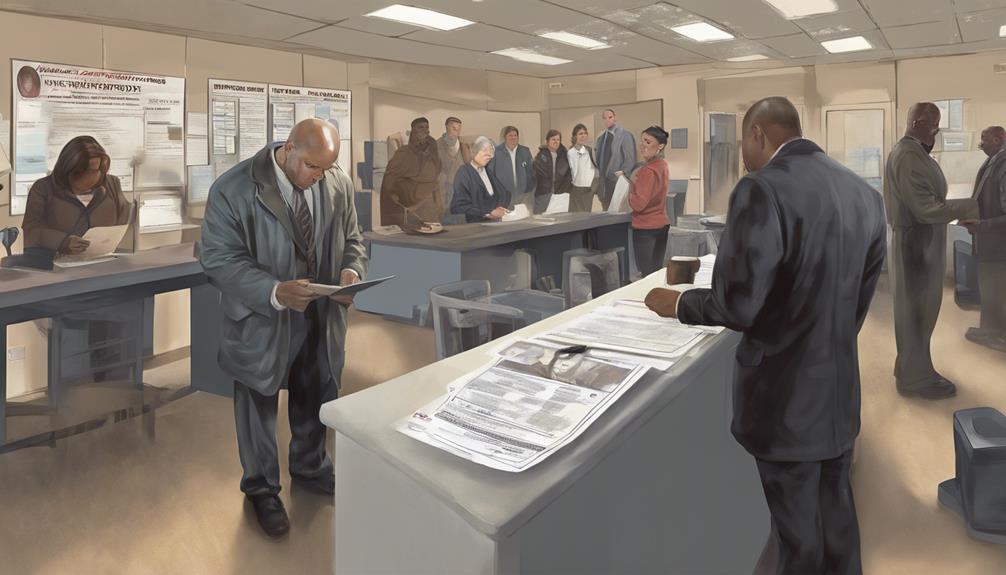Open cases, like pending charges, do show up on background checks. They can heavily impact hiring choices and how candidates are assessed. Employers must handle such information cautiously and adhere to legal regulations. Exploring legal guidance can be beneficial when dealing with open cases. Remember, open cases can greatly influence employment decisions.
Key Takeaways
- Open cases, including pending charges, can appear on comprehensive background checks.
- Visibility of open cases varies based on state laws and the depth of the background check.
- Employers may consider open cases when evaluating candidates for employment.
- Legal advice can help navigate the implications of open cases in background checks.
- Transparency with potential employers about open cases is essential for a fair evaluation.
Pending Charges in Background Checks

Pending charges in court cases may appear on criminal background checks conducted by employers. When employers run a criminal background check, pending charges can show up alongside a person's criminal record.
It's significant for individuals to be aware that pending charges don't automatically imply guilt but rather indicate ongoing legal proceedings. Employers may have varying approaches to handling the presence of pending charges on a background check, depending on specific state laws and company policies.
Seeking legal advice can be beneficial for both employers and individuals dealing with pending charges in background checks to ensure proper compliance with regulations and fair treatment in the employment process. It's important for employers to handle this information with caution and sensitivity, considering the potential impact on an individual's employment opportunities.
Understanding the nuances of how pending charges are reported and interpreted in background checks is essential for making informed decisions in the hiring process.
Visibility of Pending Cases
The visibility of ongoing court cases in background checks can greatly impact hiring decisions and candidate evaluation. Pending cases are typically included in criminal background checks, as they form part of an individual's criminal record.
However, the extent to which pending cases show up on background checks can vary depending on the specific laws of the state in question. Employers must be aware of these differences, as they may have the legal right to take pending cases into consideration when making hiring decisions.
These ongoing legal issues can give insight into a candidate's background and potential job performance. It's essential for employers to carefully assess pending cases, adhere to legal regulations, and use this information judiciously in the hiring process.
Impact on Employment Decisions

Open cases revealed in background checks can greatly influence employment decisions. Employers must carefully consider the potential implications of pending cases on a candidate's suitability for a role.
Managing hiring processes with open cases requires transparency and adherence to legal guidelines.
Employment Implications of Open Cases
During background checks, ongoing legal cases can influence employment decisions. Employers may take into account open cases as part of their evaluation process, as they could reflect potential risks or liabilities associated with a candidate.
When considering candidates with pending criminal charges, employers may have concerns about the impact of these unresolved legal matters on the individual's ability to fulfill job responsibilities. Some implications of open cases in the employment context include:
- Employers may hesitate to hire individuals with pending criminal charges due to uncertainty about potential outcomes.
- Open cases may raise questions about a candidate's credibility and trustworthiness, impacting their suitability for certain roles.
- Employers might request candidates to disclose updates or explanations regarding their open cases to assess the situation thoroughly.
Handling Hiring With Open Cases
Employers proceed with hiring decisions cautiously when faced with candidates having unresolved legal cases that could impact their employment prospects. Open cases, or pending charges, appearing on background checks can raise concerns about the candidate's suitability for the job. Employers often opt to delay final hiring decisions until they've a clear understanding of the situation and its potential implications.
It's essential for employers to assess open cases in light of the job requirements to make informed employment decisions. Seeking guidance from legal experts can assist employers in navigating the complexities associated with candidates having pending charges. By ensuring compliance with state and federal laws, employers can make fair and informed hiring decisions while considering individuals with open cases on their background checks.
Ultimately, handling hiring with open cases requires a delicate balance between legal considerations and the needs of the organization.
Legal Implications and Guidance
Legal professionals recommend seeking advice on how to navigate the legal implications of open cases on background checks and hiring processes. Employers must consider state laws and the type of background check being conducted when dealing with open cases:
- Legal Guidance: Employers should consult with legal experts to guarantee compliance with state and federal laws when considering open criminal cases in background checks.
- Fair Credit Reporting Act: Adherence to the Fair Credit Reporting Act is essential in handling background checks, including open cases, to protect candidates' rights.
- Presumption of Innocence: Employers should remember that individuals with pending charges are innocent until proven guilty, and hiring decisions shouldn't be solely based on open cases.
Federal and State Laws Overview

Federal and state laws play an essential role in determining the visibility of pending cases on background checks. Employers must adhere to these regulations when making decisions about candidates with open cases, ensuring legal compliance.
Understanding how federal and state laws intersect can guide employer actions in evaluating the relevance of open cases to the job position.
Pending Case Visibility
When conducting background checks, individuals may encounter pending cases that are subject to federal and state regulations regarding visibility.
Pending cases generally appear on federal and state criminal background checks. Federal laws, such as the Fair Credit Reporting Act, regulate the reporting of pending cases, ensuring that charges will show up on a federal background check.
However, state laws vary when reporting pending cases on background checks, with some states allowing employers to take pending cases into account in hiring decisions based on their specific regulations.
It's essential for employers to comprehend the legal implications of pending cases in background checks to make informed decisions regarding potential employees.
Employer Actions
Employers across different states must navigate a complex landscape of regulations concerning pending cases on background checks to make well-informed hiring decisions.
Federal laws, such as the Fair Credit Reporting Act (FCRA), dictate the information that can be included in background checks for employment purposes. State laws add another layer of complexity as they may differ in how pending cases are reported, influencing employer actions.
To avoid discrimination, employers must also adhere to Title VII of the Civil Rights Act when considering pending cases in background checks. In some states, employers have the authority to take adverse employment actions based on pending cases revealed in background checks.
Given these intricate legal considerations, it's advisable for employers to seek guidance from legal experts to guarantee compliance with both federal and state laws regarding pending cases on background checks.
Legal Compliance
Moving through the legal landscape surrounding open cases in background checks requires a thorough understanding of both federal and state laws. Employers must guarantee legal compliance when considering pending charges in background checks.
Federal laws, such as the Fair Credit Reporting Act (FCRA), regulate the reporting of open cases in background checks. Additionally, different states have varying regulations on the inclusion of pending charges in background checks.
To navigate this complex legal terrain, employers may seek guidance from criminal defense attorneys specializing in employment law. It's essential for employers to stay informed about laws set forth by agencies like the Equal Employment Opportunity Commission to avoid discriminatory practices based on pending misdemeanors.
Components of Comprehensive Checks
A detailed background check typically includes various components to provide a thorough evaluation of an individual's history. These components often encompass court records, pending charges, criminal convictions, and other pertinent information that potential employers may consider during the hiring process.
Court records play an important role in background checks, as they can reveal any ongoing legal matters or pending cases awaiting resolution. Employers rely on background checks to make informed decisions about prospective employees, and pending charges are a crucial factor in evaluating an individual's background.
Understanding how open cases can impact background check outcomes is essential for both employers and job seekers alike. A thorough background check goes beyond just criminal history and includes components like pending charges to ensure a complete evaluation of an individual's background and potential risks.
Handling Pending Charges Effectively

When addressing pending charges on a background check, individuals must understand the potential implications and take proactive steps to handle them effectively. Pending charges can have a significant impact on one's employment prospects, making it essential to manage them appropriately.
To navigate pending charges successfully, individuals should consider the following:
- Seek guidance from a criminal defense attorney to understand the legal aspects of the pending charges thoroughly.
- Explore the possibility of obtaining an order of nondisclosure to limit the visibility of pending charges on background checks.
- Communicate openly and honestly with potential employers about the pending charges, providing context and demonstrating steps taken to address the situation proactively.
Employers often take pending charges into account when making hiring decisions, emphasizing the importance of addressing them effectively.
Frequently Asked Questions
What Is a Red Flag on a Background Check?
A red flag on a background check signifies potential issues that could affect one's reputation or job prospects. Employers may view red flags, like open cases or pending charges, as warning signs of possible risks.
Do Pending Charges Show up on a Background Check in Michigan?
Pending charges in Michigan may appear on background checks, depending on state laws and the type of check. Employers often scrutinize such charges, as they signal ongoing legal issues. Seek legal advice for insights on pending charges' impact on employment prospects.
Do Pending Charges Show up on a Background Check in Maryland?
Pending charges in Maryland may appear on background checks. Employers conducting pre-employment screenings can see these charges. Maryland laws permit employers to take into account pending charges when making hiring decisions, potentially impacting background check outcomes.
Will Pending Charges Show up on a Background Check in Texas?
In Texas, pending charges can be a cloud looming over one's background check. Like a storm brewing on the horizon, they signal ongoing legal battles. Employers may take notice, impacting job prospects.
Conclusion
To sum up, pending cases generally don't appear on standard background checks. However, approximately 29% of employers reported that they've hired a candidate with a pending criminal charge.
Understanding the legal implications and proper handling of pending charges can help individuals navigate the job application process successfully.
Remember to stay informed and proactive when it comes to pending cases and employment opportunities.









